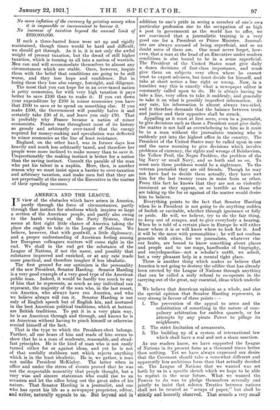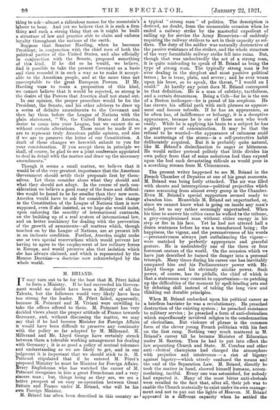AMERICA AND THE LEAGUE.
IN View of the obstacles, which have arisen in America, partly through the force of circumstances, partly through that instinct for aloofness which inspires so large a section of the American people, and partly also owing to the harsh working of the Party System, there seems at first sight little chance of America taking the place she ought to take in the League of Nations. We believe, however, that with goodwill, a little diplomacy, and a proper understanding of American feeling among her European colleagues matters will come right in the end. We shall in the end get the substance of the League of Nations, if not the name, and possibly that substance improved and enriched, or at any rate made more practical, and therefore tougher if less idealistic. The first ground for our optimism is the personality of the new President, Senator Harding. Senator Harding is a very good example of a very good type of the American public man. Indeed, it would be hardly too much to say of him that he represents, as much as any individual can represent, the majority of the men who, in the last resort, run America, who always have run America, and who we believe always will run it. Senator Harding is not only of English speech but of English kin, and nurtured in the best American political traditions, which at bottom are British traditions. To put it in a very plain way, he is an American through and through, and knows he is an American without having to pinch himself or otherwise remind himself of the fact.
That is the type to which the President-elect belongs. Further, all one hears of him and reads of him seems to show that he is a man of moderate, reasonable, and stead- fast principles. He is the kind of man who is not easily turned either for or against ideas, and yet he is not of that sordidly stubborn sort which rejects anything which is in the least idealistic. He is, we gather, a man not unlike President McKinley. The latter when in office and under the stress of events proved that he was not the respectable nonentity that people thought, but a very wise and sincere statesman who could rise to an occasion and let the office bring out the great sides of his nature. That Senator Harding is a journalist, and one who has spent his life as a newspaper proprietor, editor, and writer, naturally appeals to us. But beyond and in addition to one's pride in seeing a member of one's own particular profession rise to the occupation of as high a post in government as the world has to offer, we are convinced that a journalistic training is a very good one for a President or Prime Minister. Journal- ists are always accused of being superficial, and so no doubt some of them are. One must never forget, how- ever, that a man at the head of an Executive under modern conditions is also bound to be in a sense superficial. The President of the United States must give daily a dozen decisions of first-class importance, and must give them on subjects very often where he cannot trust to expert advisers, but must decide for himself, and take at short notice a line right or wrong. Now, in a humbler way this is exactly what a newspaper editor is constantly called upon to do. He is always having to take a line, very often to take it suddenly, and generally to take it on what is possibly imperfect information. At any rate, his information is almost always two-sided, and it therefore demands that the balance between truth and justice and their opposites shall be struck.
Appalling as it must at first seem, even to a journalist, to give decisions such as those a President must give daily, the matter is not half as overwhelming to him as it must be to a man without the journalistic training who is suddenly put into the highest office in the country. The President of the United States may be called upon in one and the same morning to give decisions which involve problems of currency, the rights and wrongs of Bolshevism, the Yellow Peril, the Negro Problem, the problem of the big Navy or small Navy, and so forth and so on. To most men these problems would be a nightmare. To the veteran journalist they are old friends. Though he may not have had to decide them actually, they have met him for the last twenty years in some form or other. From this fact he knows that they are not so violently imminent as they appear, or so terrible as those who are taking up the for or against of the matter would desire him to believe.
Everything points to the fact that Senator Harding when he is President is not going to do anything sudden of foolish or excitable, whether through ignorance or folly or pride. He will, we believe, try to do the fair thing, to keep out of scrapes, and to give everybody a hearing. When he is told of a certain place in Europe he will either know where it is or will know where to look for it. And it will be the same with personalities ; he will not confuse generals with cities, for we journalists, whatever else our faults, are bound to know something about places and people and to use maps, handbooks of biography, and encyclopaedias—not a scholar's outfit, we admit, but a very pleasant help in a mental tight place. There is another thing which makes us believe that America is not going to destroy the edifice that has already been erected by the League of Nations through anything that can be called a surly refusal to co-operate in the carrying out of the great, nay essential, ideas which underlie it.
We believe that American opinion as a whole, and also the special opinion that Senator Harding represents, is very strong in favour of three points :- 1. The prevention of the appeal to arms and the substitution of something in the nature of com- pulsory arbitration for sudden quarrels, or for attempts by any pirate Power to pillage its neighbours.
2. The strict limitation of armaments.
3. The building up of a system of international law which shall have a real and not a sham sanction.
As our readers know, we have supported the League of Nations in its present form as a thousand times better than nothing. Yet we have always expressed our desire that the Covenant should take a somewhat different and apparently less ambitious form than that actually decided on. The League of Nations that we wanted was set forth by us in a specific sketch which we hope to be able to reprint in the near future. What we wanted the Powers to do was to pledge themselves severally and jointly to insist that solemn Treaties between nations shall not be treated as " scraps of paper," but shall be strictly and honestly observed. That sounds a very small thing to ask—almost a ridiculous mouse for the mountain's labour to bear. And yet we believe that it is such a firm thing and such a strong thing that on it might be built a structure of law and practice able to claim and enforce loyalty throughout the nations of the earth. Suppose that Senator Harding, when he becomes President, in conjunction with the chief men of both the political parties of the United States, and also officially In conjunction with the Senate, proposed something of this kind. If he did so he would, we believe, find it possible to take the present Covenant as a basis and then remodel it in such a way as to make it accept- able to the American people, and at the same time not unacceptable to the great European Powers. If Mr. Harding were to make a proposition of this kind, we cannot believe that it would be rejected, so strong is the desire of the Powers that America shall not stand out.
In our opinion, the proper procedure would be for the President, the Senate, and his other advisers to draw up a series of definite amendments to the Covenant and then lay them before the League of Nations with the plain statement, " We, the United States of America, desire to come into your League, but we cannot do so without certain alterations. These must be made if we are to represent truly American public opinion, and also if we are to preserve the letter of our Constitution. A draft of these changes we herewith submit to you for your consideration. If you accept them in principle we shall, of course, be glad to see a joint conference appointed to deal in detail with the matter and draw up the necessary amendments."
Though it seems a small matter, we believe that it would, be of the very greatest importance that the American Government should settle their proposals first by them- selves. Let them consider alone what they should and what they should not adopt. In the course of such con- sideration we believe a good many of the fears and difficul- ties would be found to be far smaller than they now seem. America would have to ask for considerably less change in the Constitution of the League of Nations than is' now supposed, even if she insisted, as we hope she would insist, upon enforcing the sanctity of international contracts, on the building up of a real system of international law, and on better machinery for dealing with the prevention of the growth of armaments—all matters which, though touched on by the League of Nations, are at present left in an inchoate condition. Further, America might make one or two special reservations which would prevent her having to agree to the employment of her military forces in Europe, and would preserve also that isolation which she has always claimed, and which is represented by the Monroe Doctrine—a doctrine now acknowledged by the whole world.



































 Previous page
Previous page